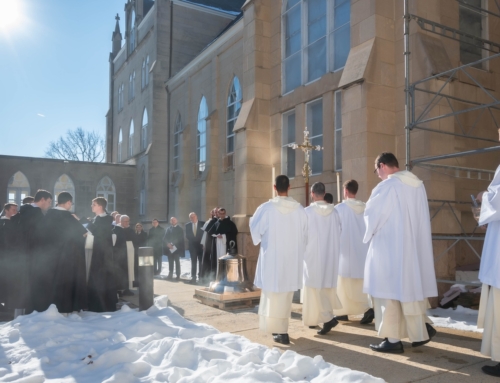Justorum animae in manu Dei sunt. In 1605, English composer William Byrd published his motet based on this text from the Book of Wisdom. The souls of the just are in the hand of God, the sacred author asserts, and the torment of death does not touch them. Pointing to the privileged position the saints enjoy, in the hand of God, this antiphon would have been sung at the Offertory of the Mass celebrating the Solemnity of All the Saints.
Et non tanget illos tormentum mortis. God protects the souls of His saints, and the torment of death shall not touch them. Yet, the ethereal harmonies of Byrd’s setting are interrupted at this point by some jarring dissonance; the text tormentum mortis is repeated three times, each iteration bringing more dissonance into the piece and reminding the hearers of the reality of their earthly existence in which the torment of death still looms large.
Though we are told that the souls of the saints enjoy peace and security in the hand of God, how can we be certain? Ordinary experience seems to point only to the fleetingness of life and the certainty of death. Where is the hand of God in all of this?
At the time Byrd composed his setting of Justorum animae, his country was still reeling from the upheaval of the English Reformation. Henry VIII had broken with Rome and executed many dissidents; his daughter tried to restore union with Rome, acquiring the moniker “Bloody Mary” along the way; her sister sought a compromise, albeit with the sword. Even after the nearly half-century reign of Elizabeth, the religious and social unrest remained. Two years after her death (and the same year Byrd published Justorum animae) anti-Catholic sentiment was once again aroused by the discovery of the Gunpowder Plot of 1605. Considering this environment of perpetual religious warfare, there is little cause for wonder at the ominous turn of Byrd’s motet. Indeed, the confident hope in avoiding the pains of warfare and the torments of death must have appeared more like folly than wisdom to at least some of Byrd’s more enlightened contemporaries. The hand of God seemed to have slipped away from the affairs of men, allowing them to sink into the mire of war and strife.
Visi sunt oculis insipientium mori. The souls of the just are in the hand of God. Yet, to the eyes of the foolish, they appear to be dead. Dead is dead, and it would seem that there are no two ways about it.
In the decades following the Crucifixion, the early Christians were no strangers to the scoffing and ridicule of the faithless. To the eyes of many, Christ appeared to be dead, and faith in Him seemed to be foolishness (1 Cor 1:22). The author of the Book of Wisdom, however, asserts that it is the eyes of the foolish that see death as the final end.Through Christ’s suffering, death, and resurrection, the final enemy—death—had been defeated, once and for all. And so, those who now place their trust in God shall shine like stars in the night for all eternity (Dan 12:3).
Illi autem sunt in pace. Those who persevered in their faith in Christ no longer walk the face of this earth, but—we firmly hope—they are in peace. And if they do not yet enjoy the peace of Christ, we trust and pray that they will one day see Him in glory.
In the new form of the Mass, this same passage of Wisdom is read as the First Reading during today’s liturgical celebration, the Commemoration of All Souls. It provides a fitting reflection for the living, prompting them to recall the snares of death in this earthly life and to pray that the departed may experience the peace and rest of being in the hand of God.
We have a confident hope that is full of immortality (Wis 3:4), but the suffering we experience in our lives is a daily reminder of our human frailty. The death of the body remains, despite the triumph of the Cross. Therefore, if our hope is founded on our own strength and merit, we are bound to fall into the snares of death. Rather, we throw ourselves and our loved ones upon the mercy and love of God, in whom we place all our trust. May the souls of the faithful departed, through the mercy of God, rest in peace.
✠
Image: John Sell Cotman, Interior of a Dormitory of the Ipswich Blackfriars at the End of its Period of Occupation







